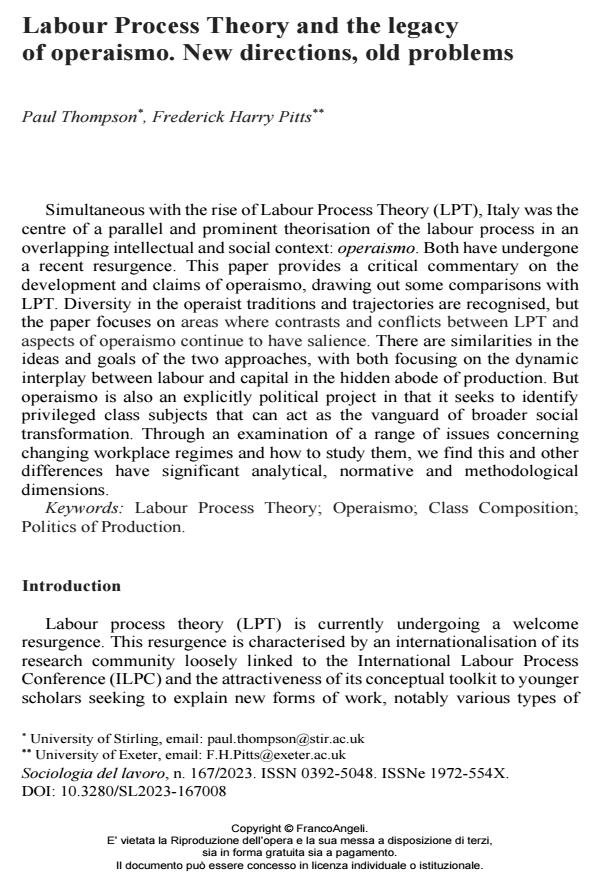Labour Process Theory and the legacy of operaismo. New directions, old problems
Titolo Rivista SOCIOLOGIA DEL LAVORO
Autori/Curatori Paul Thompson, Frederick Harry Pitts
Anno di pubblicazione 2024 Fascicolo 2023/167
Lingua Inglese Numero pagine 24 P. 163-186 Dimensione file 245 KB
DOI 10.3280/SL2023-167008
Il DOI è il codice a barre della proprietà intellettuale: per saperne di più
clicca qui
Qui sotto puoi vedere in anteprima la prima pagina di questo articolo.
Se questo articolo ti interessa, lo puoi acquistare (e scaricare in formato pdf) seguendo le facili indicazioni per acquistare il download credit. Acquista Download Credits per scaricare questo Articolo in formato PDF

FrancoAngeli è membro della Publishers International Linking Association, Inc (PILA)associazione indipendente e non profit per facilitare (attraverso i servizi tecnologici implementati da CrossRef.org) l’accesso degli studiosi ai contenuti digitali nelle pubblicazioni professionali e scientifiche
Simultaneous with the rise of Labour Process Theory (LPT), Italy was the centre of a parallel and prominent theorisation of the labour process in an overlapping intellectual and social context: operaismo. Both have undergone a recent resurgence. This paper provides a critical commentary on the development and claims of operaismo, drawing out some comparisons with LPT. Diversity in the operaist traditions and trajectories are recognised, but the paper focuses on areas where contrasts and conflicts between LPT and aspects of operaismo continue to have salience. There are similarities in the ideas and goals of the two approaches, with both focusing on the dynamic interplay between labour and capital in the hidden abode of production. But operaismo is also an explicitly political project in that it seeks to identify privileged class subjects that can act as the vanguard of broader social transformation. Through an examination of a range of issues concerning changing workplace regimes and how to study them, we find this and other differences have significant analytical, normative and methodological dimensions.
Parole chiave:Labour Process Theory; Operaismo; Class Composition; Politics of Production.
- From the age of immanence to the autonomy of the political: (Post)operaismo in theory and practice Frederick Harry Pitts, in Philosophy & Social Criticism /2026 pp.101
DOI: 10.1177/01914537241240430
Paul Thompson, Frederick Harry Pitts, Labour Process Theory and the legacy of operaismo. New directions, old problems in "SOCIOLOGIA DEL LAVORO " 167/2023, pp 163-186, DOI: 10.3280/SL2023-167008